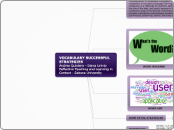VOCABULARY SUCCESSFUL STRATEGIES Andrea Quintero - Diana Univio Reflective Teaching and Learning in Context - Sabana University
The acquisition of vocabulary is arguably the most critical component of successful language learning. Learning vocabulary is a challenge for learners, partly because of the size of the task, and partly because of the variety of vocabulary types to be learned, including single words, phrases, collocations, and strategic vocabulary, as well as grammatical patterning, idioms, and fixed expressions.
VOCABULARY LEARNING STRATEGIES

WORD MEANING
STRATEGIES This is one of the most successful strategies we found due to it offers many different activities that can be developed with the learners to foster vocabulary acquisition and self-directed learning. They can be used in different order according to the main objective of the lesson.
• GUESSING FROM THE CONTEXT
This activity consists about giving several example sentences with the word in context to show the meaning, as it was stated by Nation (2001) it seems that learning the word guessing skill is best done by the class as a whole rather than individually. At first learners should work on verbs and nouns with plenty of understand able context. This strategy helps the students to learn the meaning of some words by being contextualized in the use of them in a communicative situation.
• WORD CARD TESTING
The learners work in pairs. Each learner gives their pack of cards to their partner who tests them on their recall of the meaning by saying the word and getting them to give the translation. This can also be done by giving the translation and getting them to give the word form, showing an object or a picture.
• USING THE DICTIONARY
When a useful word occurs in a reading text, the teacher trains learners in the strategy of using a dictionary.

WORD USE
STRATEGIES
• WORD DETECTIVES
The learner reports on a word he or she has found in their reading. They talk about the meaning, spelling, pronunciation, word parts, etymology, collocates and grammar of the word.
• SUGGEST COLLOCATES
The learners work together in pairs or small groups to list collocates for a given word.
SOME EXTRA STRATEGIES
REFERENCES
NATION, I.S.P. (2001) Learning Vocabulary in another Language. Cambridge: Cambridge University Press.
Gu, P. Y. (2003). Vocabulary Learning in a Second Language: Person, Task, Context and strategies.TESL–EJ7:2.
